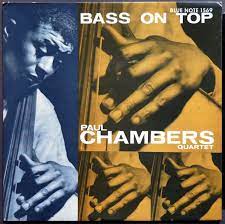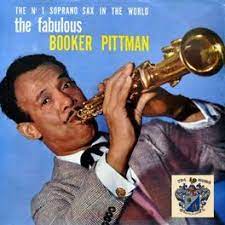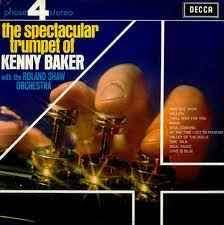
Requisites
Bass on Top ~ Paul Chambers Quartet | By Eddie Carter
I was in the mood to hear something soothing before going to bed a few nights ago. The record I chose to play inspired my first March discussion by one of the great jazz bassists, Paul Chambers. Bass on Top (Blue Note BLP 1569/BST 81569) by The Paul Chambers Quartet is a 1957 release and his second record for the label. It was one of my mom’s favorite albums to listen to when she was cooking dinner. She always loved his big and warm sound, and his playing always knocked me out whenever I heard him. He is joined on this date by a marvelous rhythm section: Kenny Burrell on guitar, Hank Jones on piano, and Art Taylor on drums. My copy is the 2021 Blue Note Tone Poet Series Stereo Audiophile reissue, sharing the original catalog number.
Side One gets underway with Paul and Kenny’s two-instrument introduction to Yesterdays by Walter Gross and Jack Lawrence. Hank and Art come in to pick up the pace to deliver the alluring melody. The standard’s only solo is a thoughtful, reflective showcase by Paul, complemented by Hank, Kenny, and Art’s delicate accompaniment leading to the gentle ending. You’d Be So Nice To Come Home To by Cole Porter brings the beat up a few notches for the bassist’s introduction, segueing into his stating the melody supported by his colleagues. Chambers starts it off with an easy swinging interpretation, then gives way to Burrell’s unhurried statement. Jones brings on the pleasant finale before the leader’s return for the reprise and conclusion.
Chasin’ The Bird by Charlie Parker affords everyone a solo opportunity and begins with Kenny’s introduction to the group’s medium melody. Paul takes the lead with a lightly swinging solo, then Hank follows with a splendid statement. Kenny comes in next for a thoroughly satisfying reading, and Art cooks comfortably in the closer, preceding the theme’s return. Dear Old Stockholm is a Swedish folk song and jazz standard that receives a medium groove by the quartet. Kenny makes the introduction, and the ensemble joins in for the opening chorus. Chambers is up first and gives a soothing interpretation. Burrell follows with a sensitive and delicate performance; then, Jones wraps up the readings with a delightfully pleasant statement until the quartet regroups for the close.
The Theme ended many of Miles Davis’ live sets. The group opens with Kenny and Paul’s introduction to their lively melody. Paul swings right out of the gate in the opening solo. Kenny follows, maintaining the infectious beat in a vibrant statement. Hank comes in and builds the next reading exquisitely; then, Art shares the finale with Paul ahead of the climax. Confessin’, aka I’m Confessin’ That I Love You by Doc Daugherty, Ellis Reynolds and Al Neiburg begins with Paul’s introduction ahead of the foursome’s lovely opening chorus. Chambers handles the first of two interpretations flawlessly with excellent taste. Jones follows with a short solo as pleasant as a Sunday evening stroll. Chambers returns to give a brief statement that brings the set to a fitting climax.
Alfred Lion produced the original session, and Rudy Van Gelder was the man behind the dials of the recording. Joe Harley supervised this reissue’s release, and Kevin Gray mastered it. The sound quality is superb, with a breathtaking soundstage. A lot of thought and care went into the remastering of this audiophile reissue. The record is pressed on 180 grams of audiophile vinyl and is incredibly quiet until the music starts. The covers could be displayed at home on any wall, and the inside gatefold photos are wonderful. Every once in a while, something magical happens in a recording session where all the musicians come together in such a way that perfection is the result. Bass on Top by Paul Chambers is one of those albums.
Paul Chambers and his bandmates compel you to listen as they’re playing and, as the album unfolds, they provide the perfect backdrop to help you unwind after a long day, night, or week. If you’re new to jazz or only know of his work as a sideman with The Miles Davis Quintet and others. In that case, I happily recommend and invite you to check out Bass on Top by The Paul Chambers Quartet the next time you’re out record shopping. It’s a stellar album of soulful, swinging jazz at its best and a title you won’t have to listen to twice to know you love it!
~ I’m Confessin’ That I Love You, Yesterdays, You’d Be So Nice To Come Home To – Source: JazzStandards.com
~ Chasin’ The Bird, Dear Old Stockholm – Source: Wikipedia.org
© 2024 by Edward Thomas Carter
More Posts: bass,choice,classic,collectible,collector,history,instrumental,jazz,music

Daily Dose Of Jazz…
Booker Pittman was born on March 3, 1909 in Fairmount Heights, Maryland, was the son of Portia Pittman and a grandson of Booker T. Washington. He became an accomplished jazz clarinetist and played with greats like Louis Armstrong and Count Basie in the US and Europe in the 1920s and 1930s.
Leaving the States for the first time in 1933, he went with Lucky Millinder’s orchestra to France and stayed there for four years. During that period, he met a Brazilian musician named Romeo Silva, who took him on a tour of Brazil along with other musicians. They sailed to Bahia aboard the Siqueira Campos.
In 1937, Booker moved to Brazil, where he was known by the nickname “Buca“, and continued his musical career there, playing at the Urca Casino. He lived in Copacabana and befriended Jorge Guinle and Pixinguinha. He also played in Argentina and other countries.
He performed and recorded with his singer/actress stepdaughter Eliana Pittman. On October 19, 1969 clarinetist and saxophonist Booker Pittman, sometimes spelled Pitman, transitioned in his home in the São Paulo quarter of Vila Nova Conceição of laryngeal cancer at the age of 60. On behest of his wife Ofélia he was transferred to Rio de Janeiro and there laid to rest at the Cemitério São João Batista in the quarter of Botafogo.
More Posts: clarinet,history,instrumental,jazz,music,saxophone

Daily Dose Of Jazz…
Minor Hall was born in Sellers, Louisiana on March 2, 1897 and was the younger brother of Tubby Hall. He studied at New Orleans University until 1914, then began playing with Kid Ory in the middle of the decade. He played in various New Orleans ensembles, including the Superior Band, then moved to Chicago, Illinois in 1918. He briefly took his brother’s spot in Lawrence Duhe’s band before serving in the U.S. Army during World War I. By the time he returned, King Oliver was leading Duhe’s band, which Hall rejoined in 1921.
In 1926 he played with Jimmie Noone, then moved to California for an extended run with Mutt Carey’s Jeffersonians from 1927 to 1932. He played in the Winslow Allen Band during the Thirties, but took a hiatus from music for part of the decade. He served briefly in the Army again in 1942.
In 1945 he rejoined Ory in his Creole Jazz Band, becoming one of his most long standing members. He remained with Ory’s ensemble until 1956, when he retired on account of poor health, having never led his own recording date, though he recorded extensively with Ory and with Louis Armstrong in the 1940s.
Drummer Minor Hall, better known as Ram Hall, died in Sawtelle, California at the age of 61 on October 16, 1959.
More Posts: drums,history,instrumental,jazz,music

Daily Dose Of Jazz…
Kenny Baker was born on March 1, 1921 in Withernsea, East Riding of Yorkshire, England. Joining a brass band, by the age of 17 he had already become a professional musician. After leaving his home town for London, he met and began performing with George Chisholm. He was first heard on record in a British public jam session in 1941 and quickly established a strong reputation in London clubs.
After serving in the Royal Air Force during WWII, the young Baker was lead trumpeter with Ted Heath’s post war orchestra, with Bakerloo Non-Stop recorded for the Decca record label in 1946. He played a tenor saxophone solo on Johnny Gray, the piece recorded by both Baker and the drummer Jack Parnell. During the 1950s, he led his own group called Baker’s Dozen and performed on the first regular jazz show, the BBC Light Programme series Let’s Settle For Music.
During this period he regularly recorded as a quartet for Parlophone, and in the Sixties and Seventies, he was on call for film and studio work. He shared top billing with comedy variety acts, continued to appear on BBC shows, and formed the Best of British Jazz show with Don Lusher and Betty Smith. He went on to play with Frank Sinatra, Petula Clark, Sammy Davis, Jr. and Tony Bennett, as well as performing on James Bond soundtracks, with The Beatles and The Muppet Show among numerous other television shows.
Trumpeter, cornetist, flugelhornist and composer Kenny Baker, who was titled three times as best trumpet player and awarded the MBE title, died in Felpham, West Sussex on December 7, 1999 after suffering from a viral infection. He was 78.
More Posts: bandleader,composer,cornet,flugelhorn,history,instrumental,jazz,music,trumpet




